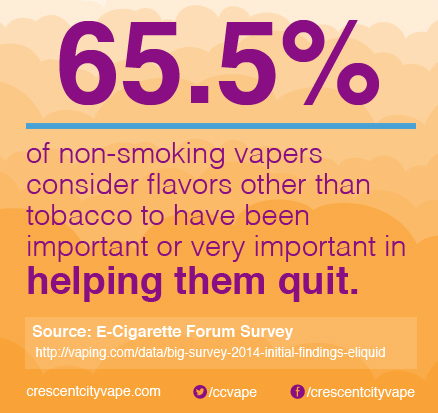 On August 8, 2014, 29 state attorneys general sent a letter to the Food and Drug Administration proposing that stricter regulations be placed on electronic cigarettes.
On August 8, 2014, 29 state attorneys general sent a letter to the Food and Drug Administration proposing that stricter regulations be placed on electronic cigarettes.
If the FDA were to follow these suggestions, selling e-cigarettes online would be prohibited, the marketing of e-cigs would be greatly limited, and — most crippling to individual and public health — all e-cigarette flavors would be banned, except for menthol.
Why Ban E-Cigarette Flavors?
The reason these state attorneys general want e-cigarette flavors banned is because they believe minors are attracted to the fruity and sweet flavors.
But that’s just an assumption, not based on any actual research. According to Dr. Michael Siegel, a Boston University School of Public Health professor with more than 25 years of experience in the field of tobacco control, “the harms to youth of trying electronic cigarettes are hypothetical because there is no evidence that e-cigarette use leads to cigarette smoking among adolescents.”
The attorneys general also claim that the rate of high-school students who have tried e-cigarettes climbed from 4.7% in 2011 to 10% in 2012. While it is troubling to see any use among high school students whatsoever, the reality is that this percentage of growth correlates with the overall growth of the e-cig industry over the same time. It also aligns with overall use of tobacco products among high school students. According to the CDC, in 2012 “23.3% of high school students currently used tobacco products.”
Research Suggests E-Cigarette Flavors Help Adult Smokers Quit Tobacco Cigarettes
On the other hand, having such a wide variety of e-juice flavors on the market is one of the biggest reasons why electronic cigarettes are actually helping hundreds of thousands of adults quit smoking traditional tobacco cigarettes, which the attorneys general overlook in their letter.
According to a survey conducted by E-Cigarette Forum of more than 10,000 of its members, “65.5% of non-smoking vapers consider flavors other than tobacco to have been important or very important in helping them quit.”
At Crescent City Vape, we’re seeing anecdotal evidence of this on a daily basis. Our customers — all of whom are over the age of 18 — are frequently requesting new flavors and brands. And we’re finding a lot of customers starting off with tobacco flavors, only to quickly lose their taste for them and shift to more tasty flavors.
Jacob Sullum, senior editor at Reason magazine, discusses additional research that supports this in a column on Forbes.com:
Survey data reported in the International Journal of Environmental Research and Public Health last December likewise indicate that flavor variety is important in quitting. That study, which involved about 4,500 vapers, found that they tended to prefer tobacco-flavored fluid initially but later switched to other flavors. Most reported using more than one flavor on a daily basis and said the variety made the experience more interesting and enjoyable.
Nontobacco flavors may assist in quitting because learning to associate your nicotine fix with a new taste creates an additional barrier to backsliding: Returning to conventional cigarettes would mean getting used to the flavor of tobacco smoke again. Alternatively, the flavor of tobacco may trigger an urge to smoke.
Self-Regulation and Child Safety
None of this is meant to condone use of e-cigarettes by adolescents. Regardless of what state law mandates, electronic cigarette companies and vape shops in the U.S. take child safety — and safety in general — extremely seriously. No one under the age of 18 is allowed inside Crescent City Vape. No one under 18 is allowed access to our website. While I can’t speak for every single company in the market, I do know that restricting minors’ access is an essential and unquestioned part of the standard operating procedures of everyone we do business with.
The evidence is clear that banning e-juice flavors would have a negative impact on public health because flavors are one of the most compelling benefits for adult smokers who turn to e-cigarettes. Let’s not forget, after all, that tobacco smoking is still responsible for more than 400,000 deaths in this country every year. A flavor ban would surely push many vapers to switch back to smoking, and persuade fewer and fewer smokers to consider a switch to e-cigs.
Let’s hope the FDA has the foresight and scientific integrity to base electronic cigarette regulations — particularly flavor restrictions — on actual research.

